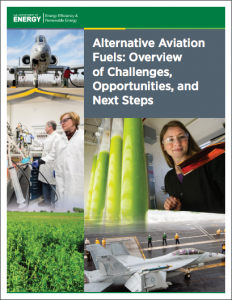Full Title: Alternative Aviation Fuels: Overview of Challenges, Opportunities, and Next Steps
Author(s): U.S. Department of Energy
Publisher(s):
Publication Date: March 1, 2017
Full Text: Download Resource
Description (excerpt):
The goal of this report is to provide bioenergy stakeholders with (1) an overview of the current state of alternative aviation fuels, as reported in findings by recent working groups, and (2) findings from the Alternative Aviation Fuel Workshop hosted by DOE’s Bioenergy Technologies Office (BETO) in September 2016.
Due to projected growth of the aviation industry, there are many important drivers to the development of alternative jet fuels, including domestic energy security, diversity of fuel supplies, less fuel price volatility, and lower long-term fuel cost. Ancillary benefits of involve growth of the bioeconomy with associated job creation and employment opportunities as well as environmental and sustainability benefits. The aviation industry faces significant challenges in improving environmental sustainability and reducing its carbon footprint. Unlike other liquid fuels (e.g., diesel or gasoline) with developed alternatives (e.g., battery or electrical power), alternatives to currently used aviation jet fuels are at the early stages of development. In the near term, the most promising option is bioderived aviation fuel, which has driven interest from industry (ranging from fuel producers to downstream consumers, including airlines and engine manufacturers) as well as governments and international agencies to initiate the development and production of aviation jet fuel.
Biofuels are key to mitigating the growth constraints of the aviation industry. Biobased jet fuels also present a tremendous opportunity to transition away from fossil fuels towards domestically produced aviation biofuel that would further reduce U.S. reliance on foreign oil and create jobs, particularly in rural areas, and to advance the mission of BETO for the development of sustainable alternative fuels.
